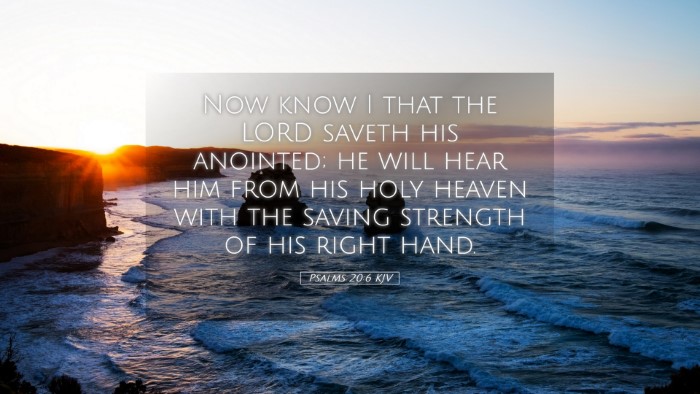Psalms 20:6 Commentary
In Psalms 20:6, the psalmist expresses a profound declaration of confidence and faith in God's deliverance. The verse states:
"Now I know that the LORD saves his anointed; he will answer him from his holy heaven with the saving might of his right hand." (ESV)
Insights from Public Domain Commentaries
Matthew Henry's Commentary
Matthew Henry highlights the confidence presented in this verse. He notes that the phrase "Now I know" signifies a transformation from uncertainty to assurance. The psalmist's faith is not merely theoretical; it is grounded in the experiential knowledge of God's past interventions. He emphasizes that God saves His anointed ones – referring to the chosen king or, by extension, all believers who trust in Him.
Henry elaborates on the meaning of "his holy heaven," noting that it embodies God's supreme power and authority. The mention of "the saving might of his right hand" evokes the imagery of strength and protection, referencing God's sovereign ability to rescue those who call on Him. This assurance, therefore, not only comforts believers but also affirms God's faithfulness throughout history.
Albert Barnes' Notes on the Bible
Albert Barnes provides an analytical breakdown of the verse, focusing on the certainty of divine assistance. He interprets "Now I know" as a decisive affirmation of faith, underscoring the psalmist's realization of God's saving power. Barnes points out that this verse contrasts the uncertainties of human capability with the absolute reliability of God’s intervention.
He remarks on the use of "his anointed," connecting it to the concept of the Messiah, a term that resonates deeply in the context of Jewish hope. Barnes suggests that the assurance of being answered "from his holy heaven" speaks to the believer's access to God’s presence and support, mediated through prayer and reliance on God’s will. His commentary reflects on the broader implications of God’s saving might, indicating that it serves not just personal deliverance but the overarching divine plan for redemption.
Adam Clarke's Commentary
Adam Clarke offers a rich theological perspective by emphasizing the prophetic dimension of this verse. He argues that "the LORD saves his anointed" acknowledges both the historical context of David’s kingship and the typological significance of Christ as the ultimate anointed one. Clarke connects the psalmist's faith with the anticipation of divine kingship that transcends the immediate circumstances.
Furthermore, Clarke discusses the importance of the "right hand" in biblical literature, often symbolizing God's power and action. He elucidates that the understanding of being "answered" implies the necessity for believers to engage in prayer, which aligns human petitions with divine purposes. His commentary stresses that understanding God's saving grace is essential for effective worship and confidence during trials.
Theological Implications
This verse serves to reinforce several critical theological points:
- The Sovereignty of God: The psalmist's confidence underscores the overarching sovereignty of God in human affairs, reassuring believers of His active role in deliverance.
- Understanding Anointing: The reference to "his anointed" invites further exploration into the biblical concept of anointing and its implications for understanding the Messiah.
- Access to God: The notion of being answered from "his holy heaven" illustrates the relationship between God and believers, emphasizing the importance of prayer as a means of communication with the Divine.
- The Assurance of Salvation: The phrase "saves his anointed" not only refers to physical salvation but encapsulates the broader notion of spiritual salvation and redemption through faith.
Conclusion
Psalms 20:6 stands as a profound affirmation of faith in God's ability to save and deliver, resonating deeply within the hearts of believers throughout the ages. The insights gained from the commentaries of Matthew Henry, Albert Barnes, and Adam Clarke enrich the understanding of the verse, laying a foundational basis for both personal faith and collective worship. For scholars, pastors, and students, this verse is a reminder of the vital intersection between divine sovereignty and human dependence on God’s grace in times of need.


